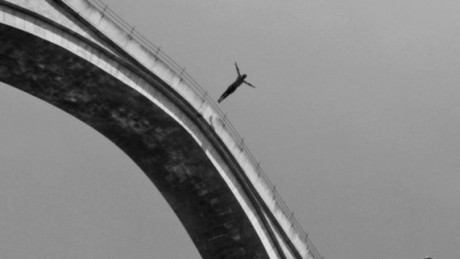


Didem Pekün: Araf

Surprise me, give me something extraordinary, make the form important, challenge me, make me learn something new. This Turkish film, 45 minutes long, fulfilled the wishes of this old documentary addict. It has many layers and instead of me trying to give a summary of the content, here is the description from the filmmakers as I read it after watching the vimeo link:
Araf is an essayistic road movie and diary of a ghostly character, Nayia, who
travels between Srebrenica, Sarajevo, and Mostar in Bosnia. She has been in exile since the war and returns for the 22nd memorial of the Srebrenica genocide. The film is guided by her diary notes of the journey, which merge with the myth of Daedalus and Icarus – Icarus being the name given to the winner of a bridge diving competition in her home country. The story of Icarus and Daedalus, a myth symbolic of man’s over-ambition and inevitable failure, is woven throughout the film as a way to think about exorcizing the vicious cycle of such events happening in the future and of a possible reconciliation. Nayia also thinks of Icarus from a different perspective, that of seeing the optimism of such a leap, his braveness in taking a leap into the unknown in this era of radical instability, that perhaps Icarus wanted to write a different narrative. Araf thus traces these paradoxes through Nayia’s displacement and her return to her home country post-war – that of a constant terror and a permanent standstill, and the friction between displacement and permanence.
But film is a very concrete medium so let me try to describe the form, the aesthetic choices that the director has chosen to make the film so impressive as a Film. As Cinema. She works with a literary diary text – unfortunately, my only objection, sometimes with an English language that is difficult to understand – she has filmed in b/w, uses slow motion, uses a structure where she goes back to the jumper/diver/Icarus from the Mostar bridge to film that from all angles, creating a lyrical tone, ending up in Srebrenica where you watch the faces and hands and movements of the visitors in mourning. It goes with a beautiful choice of music and a sound score that is in perfect sync with the images. It is beautiful and emotional, when you hear the names mentioned of the victims of the massacre. As it is said “… 22 years after there are still tombs to be filled…”. There is also some sarcasm in the text, when you see a wall on which UN is written, “… they call UN United Nothing here…”
PS. I had to go to Wikipedia to get to know the meaning of the title “Araf”: A’raf (Arabic: الأعراف) is the Muslim separator realm or borderland between heaven and hell,[1] inhabited by the people who are evenly balanced in their sins and virtues. This place may be described as a kind of beneficent purgatory with privation but without suffering. The word is literally translated as “The Heights” in English. The realm is described as a high curtain between hell and paradise.[2] Ibn Kathir described A’raf as a wall that contains a gate.[3] In this high wall lived people who witness the terror of hell and the beauty of paradise. They yearn to enter paradise, but their sins and virtues are evenly balanced. Yet with the mercy of God, they will be one of the last people to enter the paradise.
Turkey, 2017, 45 mins.